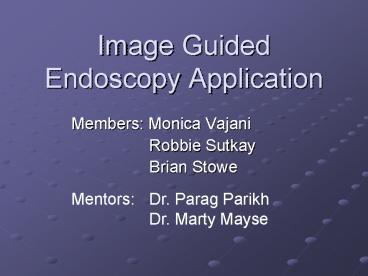Image Guided Endoscopy Application - PowerPoint PPT Presentation
1 / 12
Title:
Image Guided Endoscopy Application
Description:
Image Guided Endoscopy Application. Members: Monica Vajani. Robbie Sutkay. Brian Stowe ... Lung cancer is a leading cause of cancer death in the US ... – PowerPoint PPT presentation
Number of Views:356
Avg rating:3.0/5.0
Title: Image Guided Endoscopy Application
1
Image Guided Endoscopy Application
- Members Monica Vajani
- Robbie Sutkay
- Brian Stowe
Mentors Dr. Parag Parikh Dr. Marty Mayse
2
Background
- Lung cancer is a leading cause of cancer death in
the US - More than 150,000 solitary pulmonary nodules
(SPNs) are reported annually in the US - Less than 3-4 cm in diameter (no larger than 6
cm) - 60 of all SPNs are benign (not cancerous).
3
CT scans and Fluoroscopy
- A chest CT scan is often performed to evaluate a
solitary pulmonary nodule in detail. - Uses a computer and a rotating x-ray device to
create detailed, cross-sectional images, or
slices, of organs and body parts. - About 1,000 profiles are taken in one rotation
- Each profile is analyzed by computer
- Full set of profiles from each rotation is
compiled to form a two-dimensional image.
- Fluoroscopy is often used to locate pulmonary
nodules - Continuous x-ray beam is passed through the body
part being examined - A dye or contrast substance may be injected into
the IV line in order to better visualize the
structure being studied. - Less accurate than a CT scan
- Used to detect internal movement
4
Problem
- Biopsy is needed
- Bronchoschopy
- Needle Biopsy
- Inserted through the mouth or nose, then slowly
passed down into the trachea and bronchi - Too large to penetrate past trachea
- Memorize location using CT data
http//www.nlm.nih.gov/medlineplus/ency/images/enc
y/fullsize/9761.jpg
5
Problem
- Fluoroscopy
- Shows a 2-D real-time X-Ray
- Nodules are three-dimensional
- Does not recognize masses smaller than 2cm
- Success rate of reaching lesions in the periphery
35 - False negatives (50)
6
Existing Solutions superDimension
- A flexible catheter with 360 degree steering
capability (US 7,233,820) - Catheter tip has a sensor
- Accurate up to 1 mm
- Samples over 150 times/sec
- High signal-to-noise ratio
- Localization board generates an electromagnetic
field (Journal of Bronchology Vol 12, Number 3,
July 2005) - Sensor is activated once it enters EM field
- Wirelessly tracked by board as it moves through
the patient - Displayed on 3D CT Roadmap
- Bronchoscopic - compatible
7
superDimension Benefits
- Non - invasive
- Many patients are elderly and fragile
- Low cost (70,000/unit, 700-900 for
disposables) - Higher accuracy earlier detection
8
Preliminary Analysis of Improvements
- Localization board
- Minimum accuracy .27 mm X, .36 mm Y, .48 mm
Z - 4D CT Scan
- Scans at 1.5 mm intervals
- 21 gauge needle
- Diameter .8128 mm
- Apparatus and method for equalizing histogram of
an image (No. 10087831, 3/5/2002) - Account for biomechanical forces friction
9
Bronchoscopy Specifications
- Reach 85 of the lungs
- Have a success rate of 75 (Success defined as
obtaining a portion of the correct tissue mass) - 1 mm accuracy obtaining a biopsy
- Observation Range 0.1 5 cm
- Field of View 120
- Flexible Portion Diameter 0.49cm
- Location sensor on tip 1 mm large
- System cost 70,000
- Catheter length of 90 cm (60 cm working length)
- Dimensions 35cm x 7.5cm x 42cm
- Weight 8 kg
- Power 120V 60Hz 0.36A
10
Design Schedule
24 Sep First Oral Report (Monica) 28 Sep Watch
Bronchoscopy 1 Oct Written Report (Whole
team) 10 Oct Webpage submission 18 Oct Design
Solidified 22 Oct 2nd Oral Report (Robbie) 29
Oct 1st Written Report Due 31 Oct Risk
Assessment / DesignSafe 5 Dec Final Oral
Report (Brian) 5 Dec 2nd Written Report Due 12
Dec Poster Symposium
11
Organization of Our Team
12
References
- Dvorin, Nancy. superDimension Guided
Bronchoscopy to the Lungs Periphery.Windhover
Information 10 (2005) - Gildea, Thomas. "Electromagnetic Navigation
Diagnostic Bronchoscopy A Prospective Study."
American Journal of Critical Care and Respiration
2(2006) - Becker, Heinrich D.,Bronchoscopic Biopsy of
Peripheral Lung Lesion Under Electromagnetic
Guidance A Pilot Study. The Journal of
Bronchology 12 (2003) - Computed Tomography (CT) Body 23 Sep 2007
lthttp//www.radiologyinfo.org/en/info.cfm?pgbodyc
tbhcp1.gt - Computed Tomography (CT) Scan of the Body 21
Sep 2007 lthttp//www.webmd.com/a-to-z-guides/Compu
ted-Tomography-CT-Scan-of-the-Body.gt































